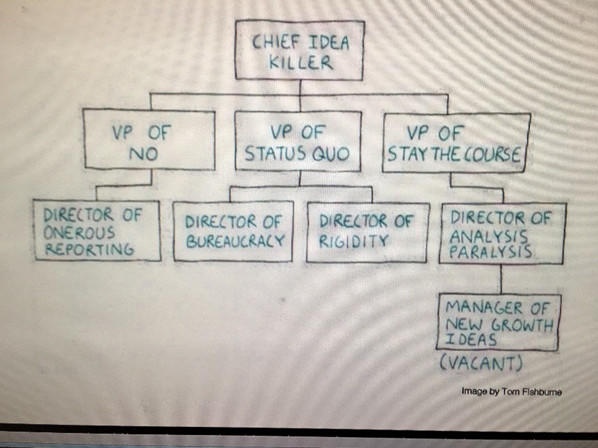Rodger Holden explains how you deal with the "don’t/can’t/won’t do it brigade", and start embracing new ideas and initiatives.
Having spent over twenty years in the charity sector in fundraising the enthusiasm to make a difference and support lasting impact remains unchanged. Sometimes this involves presenting new ideas and initiatives. It is important to win over both internal stakeholders as well as new business prospects.
The biggest challenge on both counts often lies with the “Don’t/Can’t/Won’t do it” brigade. These are people who don’t only hold decision-making and influencer positions, they are all around us. It’s our job to navigate our way around them.
The blocker brigade is actually quite a significantly sized workforce. In any office it is often easy to identify them. What applies within the office environment is also true when approaching new business contacts especially in corporate fundraising.
Quite an amusing organigram highlights the problem.

As the organogram shows there are different types of internal and external blockers. Most organisations, including charities, and fundraising departments are intrinsically conservative. Change is can be glacial.
In terms of personal profiles, blockers come in different shapes and sizes.
There are those who just don’t see the point of change, view it as an encroachment on a pleasant life, others are just too busy, and there are those whose powers of analysis leads them on the path to paralysis. Other types absorb themselves with process, mass collaboration and bureaucracy. There are people who strive for perfect weather conditions but never leave the house, “excellence is the enemy of good” comes to mind. A blocker to look out for is the one presenting as someone who is on the side of change. They identify issues with process, performance, and vision, but their approach is critical and negative, their solutions often involving unrealistic leaps. These people tend to alienate goodwill and damage trust.
Blockers fall into two groups
Finally, blockers often fall into two groups: those who have low influence and support; and blockers who have high influence.
Sometimes these individuals seem to take a perverse pride in their ability to block initiatives while others parley as a friend until the critical moment of making a decision.
Indeed, blockers can be highly respected within their organisation, wherever they sit in the pecking order. They are viewed as wise, level-headed and prudent, often the steady hand on the tiller. They might regard themselves as rationalists while those people who seek to make a difference are viewed as disruptive or even quixotic. Ultimately blockers are happiest when they have control of their work environment and don’t appreciate anyone who upsets the equipoise. Indeed, a reasonable indication of an organisation’s attitude towards change can be measured by the number of people whose job title gives them some freedom. It isn’t many.
Fortunately, the word impossible is found only in the dictionary used by fools. Fundraisers should feel emboldened by this sentiment.
Introducing the “new” isn’t an easy task. Determination, diplomacy, patience, the ability to listen, and integrity are given essentials. However, fortitude only goes so far and a plan is needed.
It is good to remember that you aren’t alone. There are people within your organisation, not all of whom are fundraisers, who are like-minded. Some are more vocal, others quieter, some possibly brow-beaten and accepting of the status quo could become receptive to overtures. The first step is to identify these individuals and engage them.
Self-interest is a strong emollient if this makes the organisation and also these people look good. Identify a problem within the organisation relevant to your work, initially an easier one, and support a solution. As an example, at the independent charity, Crimestoppers, the decision was made by the fundraising department, with proactively minded individuals in management, to employ bid writers to support the work of our regional operation’s staff. After years of mistrust, the two areas of the charity now have a close working relationship, especially as this has led to greater funding for regional positions.
Turning to our new business prospects we should acknowledge that they might very well be a Blocker. If they have strong blocker leanings then seek out others within the organisation that might have even greater need of the service and would welcome an approach. They are more likely to be proactive and want to make a difference.
Crimestoppers provides services to support companies prevent, reduce and detect crime. It was standard practice to assume the security manager as the main point of contact. However, also making contact with governance, compliance, legal or marketing departments has proved beneficial because their need is sometimes greater.
When individuals are identified allow them to join the crusade and become proselytizers while always recognising the requirement to stoke their self-interest. It is wonderful meeting like-minded people and making things happen.
Rodger Holden is director of business development at Crimestoppers.
|









